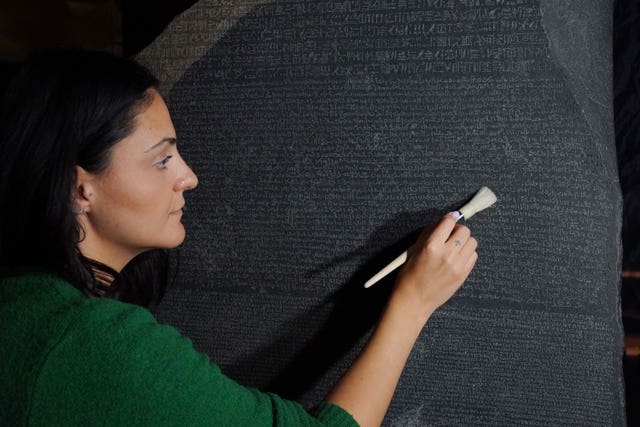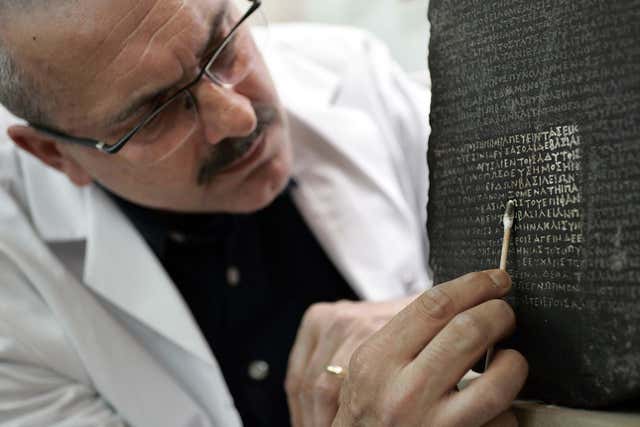Egyptians call on British Museum to return Rosetta Stone
Two petitions are calling for the stone, which helped historians to crack the code of ancient hieroglyphics, to return to its country of origin.

Thousands of Egyptians have demanded the return of the Rosetta Stone from the British Museum.
The bilingual carvings on the relic proved to be the breakthrough in the decipherment of ancient Egyptian hieroglyphics after being unearthed by colonialists in Egypt in 1799.
The stone is the centrepiece of a new exhibition at London’s largest museum, celebrating the 200th anniversary of the stone’s decipherment.
Monica Hanna, dean at the Arab Academy for Science, Technology and Maritime Transport, has organised one of two petitions calling for the stone’s return.
She said: “The British Museum’s holding of the stone is a symbol of Western cultural violence against Egypt.”
The acquisition of the Rosetta Stone was tied up in the imperial battles between Britain and France. After Napoleon Bonaparte’s military occupation of Egypt, French scientists uncovered the stone in 1799 in the northern town of Rashid, known by the French as Rosetta.
When British forces defeated the French in Egypt, the stone and over a dozen other antiquities were handed over to the British under the terms of an 1801 surrender deal between the generals of the two sides.

Ms Hanna’s petition, with 4,200 signatures, says the stone was seized illegally and constitutes a “spoil of war”.
The claim is echoed in a near identical petition by Zahi Hawass, Egypt’s former minister for antiquities affairs, which has more than 100,000 signatures. Mr Hawass argues that Egypt had no say in the 1801 agreement.
The British Museum denies this. In a statement, the Museum said the 1801 treaty includes the signature of a representative of Egypt. It refers to an Ottoman admiral who fought alongside the British against the French.
The Ottoman sultan in Istanbul was nominally the ruler of Egypt at the time of Napoleon’s invasion.
The Museum also said Egypt’s government has not submitted a request for its return. It added that there are 28 known copies of the same engraved decree and 21 of them remain in Egypt.
The contention over the original stone copy stems from its unrivalled significance to Egyptology. Carved in the second century BC, the slab contains three translations of a decree relating to a settlement between the then-ruling Ptolemies and a sect of Egyptian priests.
The first inscription is in classic hieroglyphics, the next is in a simplified hieroglyphic script known as Demotic, and the third is in Ancient Greek.

“Scholars from the previous 18th century had been longing to find a bilingual text written in a known language,” said Ilona Regulski, the head of Egyptian Written Culture at the British Museum.
Ms Regulski is the lead curator of the museum’s winter exhibition, “Hieroglyphs Unlocking Ancient Egypt”, celebrating the 200th anniversary of Champollion’s breakthrough.
The stone is one of more than 100,000 Egyptian and Sudanese relics housed in the British Museum. A large percentage were obtained during Britain’s colonial rule over the region from 1883 to 1953.
It has grown increasingly common for museums and collectors to return artefacts to their country of origin, with new instances reported almost every month. Often, such returns are the result of a court ruling, while some cases are voluntary, symbolising an act of atonement for historical wrongs.
For Ms Hanna, Egyptians’ right to access their own history should remain the priority. “How many Egyptians can travel to London or New York?” she said.
Egyptian authorities did not respond to a request for comment regarding Egypt’s policy toward the Rosetta Stone or other Egyptian artefacts displayed abroad. Mr Hawass and Ms Hanna said they are not pinning their hopes on the government to secure its return.
“The Rosetta Stone is the icon of Egyptian identity,” said Mr Hawass. “I will use the media and the intellectuals to tell the (British) museum they have no right.”





